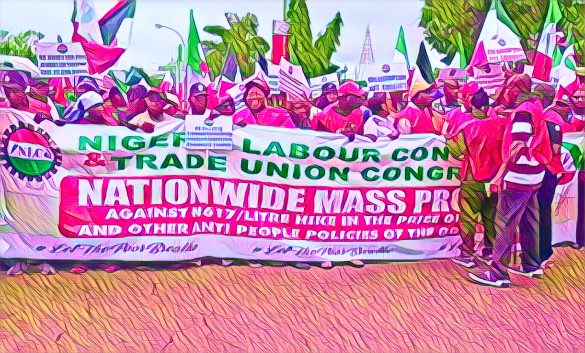Nigeria’s two largest labour unions have announced an indefinite strike from October 3 to protest against the government’s decision to scrap the fuel subsidy and the rising cost of living in the country. The strike is expected to paralyse economic activities and affect millions of Nigerians who are already struggling with inflation, currency devaluation and power shortages.
The Nigeria Labour Congress (NLC) and the Trade Union Congress (TUC) said they had no choice but to resort to industrial action after the government failed to address their demands in negotiations. They accused the government of being insensitive to the plight of workers and the masses, who have been hit hard by the removal of the fuel subsidy and other harsh economic policies.
The fuel subsidy, which had kept petrol prices low for decades, was abolished by President Bola Tinubu in May, shortly after he assumed office. He said the subsidy was unsustainable and a drain on the public finances. He also allowed the naira to float freely, leading to a sharp depreciation of the local currency against the US dollar.
These reforms, which Tinubu said were necessary to attract investment and boost the economy, have triggered a surge in inflation, which reached 25 percent in August. The cost of food, transport, power and other essentials have also skyrocketed, as most businesses and households rely on petrol generators for electricity.
The unions said they had presented a list of demands to the government, including a reversal of the fuel subsidy removal, a review of the minimum wage, a reduction of electricity tariffs, and an end to police brutality and harassment of union activities. They also demanded that the government stop the campaign of calumny against union leaders on social media.
However, the government has appealed to the unions to shelve the planned strike, saying it would worsen the economic situation and hurt the poor and vulnerable. It said it had taken some measures to mitigate the impact of the reforms, such as distributing funds to state governments, providing transport options and small business loans, and initiating a dialogue with various stakeholders.
The unions, however, said these measures were inadequate and cosmetic, and that the government had shown no genuine commitment to addressing the root causes of the economic crisis. They urged all workers in Nigeria to withdraw their services from their workplaces from October 3, and called on all patriotic Nigerians to join them in street protests and rallies until the government responds positively to their demands.
The strike, if successful, will be the biggest industrial action in Nigeria since 2012, when a similar protest over fuel subsidy removal lasted for a week and forced the government to partially restore the subsidy. The strike will also pose a major challenge to Tinubu’s administration, which has been facing criticism over its handling of the economy, security and corruption.
Nigeria, Africa’s largest oil producer and most populous nation, has been suffering from low oil prices, militant attacks on oil facilities, a resurgence of separatist agitation, and a deadly insurgency by the Islamist group Boko Haram. The country is also recovering from the effects of the Covid-19 pandemic, which pushed it into its second recession in five years in 2020.
Despite the bleak outlook, some analysts and observers have expressed hope that the strike could serve as a catalyst for positive change and social justice in Nigeria. They said the strike could pressure the government to adopt more inclusive and sustainable policies, and also create a platform for dialogue and collaboration among the various segments of the society.
Source: Premium Times


